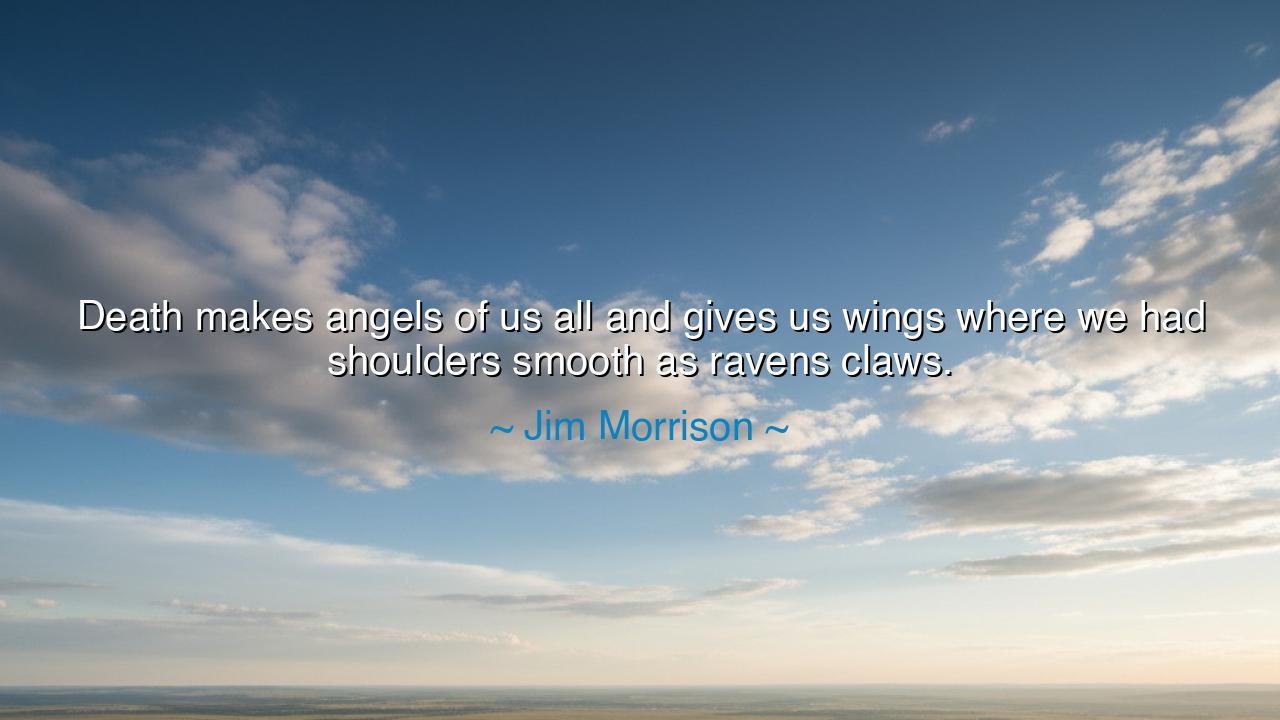
Death makes angels of us all and gives us wings where we had
Death makes angels of us all and gives us wings where we had shoulders smooth as ravens claws.






“Death makes angels of us all and gives us wings where we had shoulders smooth as raven’s claws.” Thus wrote Jim Morrison, poet, mystic, and singer of The Doors, whose words soared between the realms of the living and the eternal. In this haunting verse, he transforms death from a shadow of fear into a transformation — a passage from the finite into the infinite, from frailty into divinity. Morrison, like the poets and prophets of old, did not see death as destruction, but as metamorphosis, the final act of becoming. For in his eyes, death strips away the illusions of flesh and time, leaving behind only what is pure, eternal, and luminous — the angelic spirit within us all.
Morrison lived at the edge of existence, both fascinated and tormented by its limits. To him, life was a brief and beautiful storm, but death was the calm beyond — not an end, but an unveiling. His quote comes from a mind steeped in the mythic and the philosophical, influenced by the ancient Greeks, by mysticism, and by the idea that every soul carries within it the potential for transcendence. When he speaks of death “giving us wings where we had shoulders smooth as raven’s claws,” he imagines mortality as the sculptor that perfects the soul, fashioning from our mortal weakness something capable of flight. The raven, dark and symbolic of death itself, becomes in his imagery not a terror, but a teacher — for even the claws of the raven are smoothed when one becomes an angel.
To understand his words fully, one must first see that Morrison viewed life as a paradox: a divine prison, both sacred and suffocating. He believed that death was not the negation of life, but the completion of it — the moment when all that was bound becomes free. Like the philosophers of old, he sensed that human beings are spiritual creatures trapped within mortal cages. Our bodies, with their “shoulders smooth as raven’s claws,” symbolize limitation — we reach, but we cannot fly. And yet, when death comes, those same shoulders sprout wings. What once was human becomes eternal, what once was limited becomes limitless. In death, he suggests, we reclaim the freedom that was always ours, though we did not see it.
History offers many echoes of this vision. Consider the passing of Joan of Arc, burned at the stake by men who feared her courage and her faith. As the flames rose, she did not cry out in despair; she called upon her Lord. Her mortal body perished, but her spirit took flight — and in death, she became more powerful than she ever was in life. The very empire that condemned her would one day call her a saint. So it is with Morrison’s teaching: death gives wings to those whose souls have lived with passion and truth. It takes from us our earthly frailty and gives back the immortality that courage and love have earned.
In this way, Morrison joins a lineage of poets and sages — from the ancient Egyptians who saw the soul ascend as a bird, to Dante who saw in Paradise the perfection of the human form transfigured by light. He saw life and death not as opposites, but as partners in a sacred cycle. Death, to him, was the great equalizer, the moment when all human masks fall away. The king and the beggar, the artist and the warrior — all become angels, stripped of title and ego, purified by the same cosmic fire. In this transformation, he found not despair, but beauty, for it is death that completes the song of life, giving it its final, transcendent note.
But Morrison’s words carry another layer still — one of warning. For he knew that not all who die become angels in spirit. The transformation he speaks of is symbolic: it is the release of truth, art, and love into eternity. Only those who have lived deeply, who have dared to face their own darkness, can truly rise beyond it. Death reveals what we were within. To live without awareness, to drift through existence without meaning, is to arrive at the end unformed, with no wings to bear the soul upward. Thus, his words urge us to live consciously, to embrace life’s pain and wonder alike, for every experience polishes the wings that one day will carry us home.
So, my child, take this wisdom as both comfort and challenge. Do not fear death, for it is merely the next verse in the eternal song of being. But more importantly, live in such a way that when your time comes, your soul will already have learned how to fly. Love fiercely, forgive freely, seek truth without fear. Cultivate your inner wings through compassion, art, and courage. When you stumble, remember that even the raven — the bird of darkness — is part of the divine design, guiding the soul toward light.
For as Jim Morrison teaches, death makes angels of us all — but it is how we live that determines the brightness of our wings. Live boldly, so that when the final moment arrives, it will not be a fall, but a flight — a return to the vast and shining home from which all souls first came.






AAdministratorAdministrator
Welcome, honored guests. Please leave a comment, we will respond soon